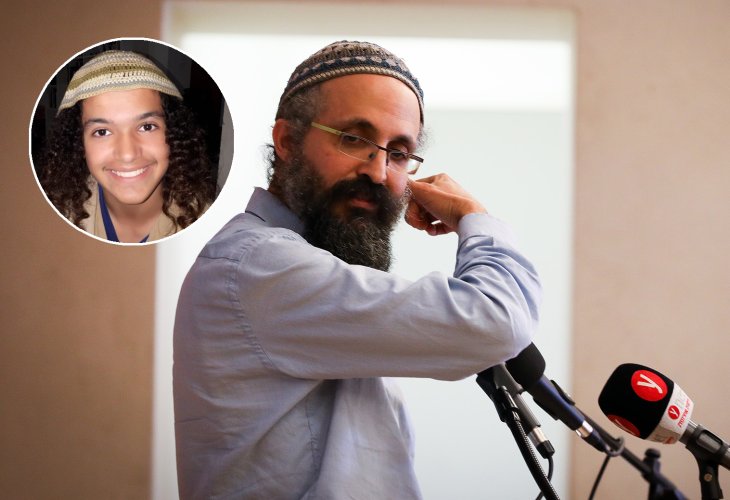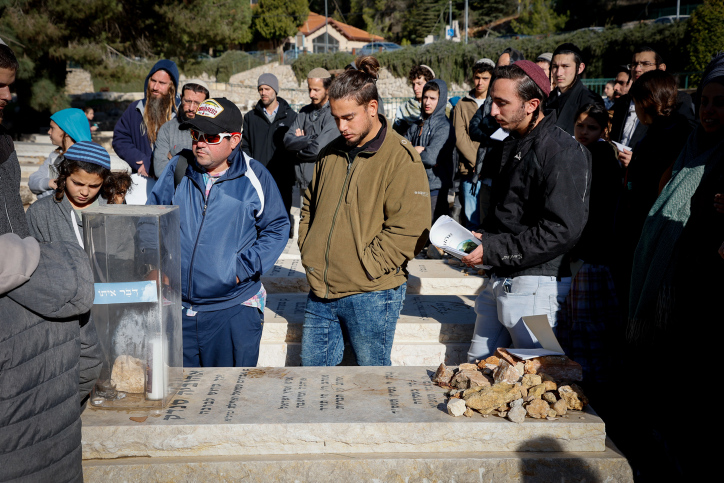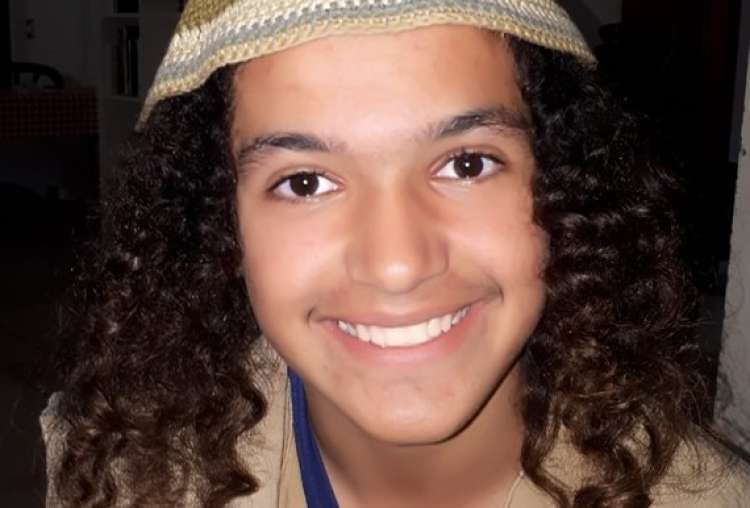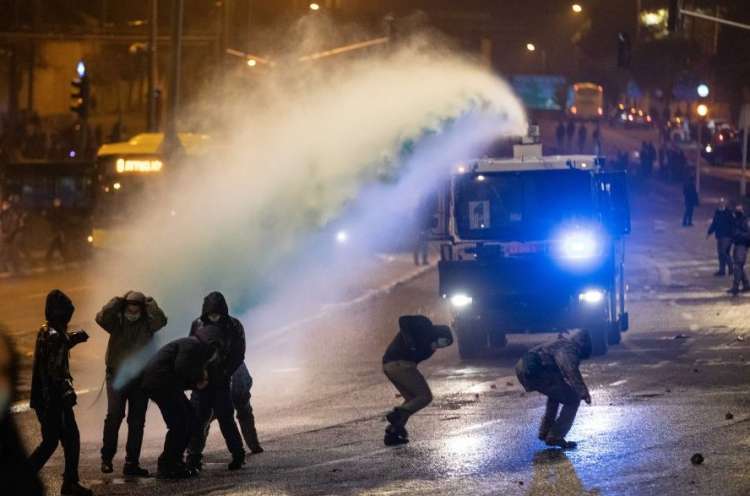A Father’s Quest for Justice: The Story of Ahuvia Sandak
A year after the tragic passing of Ahuvia Sandak, his father Abraham continues to seek justice for his son. In an emotional interview, he recounts the ongoing challenges and the truth he hopes to uncover through a newly formed investigative committee.
 Abraham Sandak (Photo: Noam Revkin Fenton / Flash 90)
Abraham Sandak (Photo: Noam Revkin Fenton / Flash 90)A year has passed since the tragic passing of his son, yet Abraham Sandak, father of the young Ahuvia Sandak who lost his life in a police chase, still struggles to cope with the heavy loss. Despite the grief, he speaks with hope and faith, repeatedly calling for 'Justice for Ahuvia.'
In a conversation marked by the anniversary of his son’s death, Abraham tells us, "The pain of losing a child does not diminish as months go by; in fact, it intensifies. The sadness is constant. Although we have experienced many trials and tribulations since the tragedy, we are grateful to Hashem 'for miracles every day' and for the strength to persevere." Abraham recalls a recent discussion with Rabbi Uri Zohar, who noted that Ahuvia, in his passing, achieved a significant spiritual rectification for this generation, referencing the holy Zohar. "Without a doubt," the grieving father says, "Ahuvia is remembered by many as a symbol of one who gave his life for Torah, love for the people of Israel, and the land with deep devotion."
Living in the settlement of Bat Ayin in Gush Etzion, Abraham raises his six remaining children, the siblings of the late Ahuvia. He describes it as having 'seven children in spirit and six in body.' The painful news of his son's death reached him on a Friday, in the Jewish month of Tevet, and since then, he has not found peace. Besides the immense grief, he has tirelessly pursued justice against the police officers involved. "An entire year has passed, and it is unacceptable that the police officers from the incident have not been brought to justice. We only wish for a thorough investigation," he pleads.
 (Photo: Gershon Elinson / Flash 90)
(Photo: Gershon Elinson / Flash 90)
Challenging Testimonies in the Mall
Abraham Sandak has endured much in the past year. Since his son's passing, his inspiring fight for justice has captured the nation's attention. Last month, justice seemed within reach when a joint investigative committee was formed, initiated by Knesset member Ben Gvir, to probe Ahuvia’s death.
"Though it’s not a full parliamentary committee, the discussion itself presses the system, signifying public scrutiny," Abraham explains. Notably, representatives from various political sides participated, making clear the widespread concern over potential cover-ups. "The session demonstrated police inadequacies so profoundly that the committee chair, Merav Ben Ari, confronted the state attorney's representative, who was at a loss for answers."
During the Knesset session, Abraham mourned his son openly. "Ahuvia, who always smiled brightly, created a group to serve soldiers. Every day, I studied the Bible with him. He was a shepherd, living the sanctity of Israel. Attempts to whitewash the events only highlight his loss. Members of the Knesset, I ask you to clear this stain of our son's death," he implores.
 Ahuvia Sandak z
Ahuvia Sandak zYou launched a program against police violence following your personal tragedy. What is the concept behind this?
"Our campaign against police violence arose because, after the tragedy, we became a focal point for similar stories. It’s an ongoing issue. Even in everyday settings, like when I load groceries at the mall, people approach me with police violence stories. They see us as companions in this cause because we, too, suffered from police aggression."
"The stories we receive are severe," Abraham notes. "Police misconduct or the whitewashing of investigations is frequent. An incident in our family involved my relative, a pizza delivery man, who was wrongly suspected by police, resulting in a traumatic confrontation. This incidence chillingly mirrors Ahuvia's story, ending similarly with no accountability."
"We want to change the reality where police commit crimes without standing trial. We’ve created a platform to collect these stories of police violence, aiming to bring them to light and address them. Behind our actions is a need for substantial change in police practices."
Beyond their confrontation with law enforcement, the Sandak family focuses on spiritual efforts honoring Ahuvia’s memory. "It feels like many strive to fill the void Ahuvia left," Abraham says. "This is particularly evident in the area of settling the land, a matter he was passionate about. Following the tragedy, we’ve seen a rise in people settling across Israel and increased financial support for these causes."
The family led various initiatives, like the crowdfunded campaign 'Justice for Ahuvia.' A notable achievement was the completion of a Torah scroll dedicated to Ahuvia at the community synagogue, a vibrant spot where his legacy continues."
40 Minutes Beneath the Vehicle
Abraham received the devastating news of his 16-year-old son's death not from rescue units or the police, but from the parents of other youths in the vehicle struck by a police car during the chase. "The police didn’t inform us of his condition even hours after the incident," Abraham protests.
A year later, the events of Benyamin's roads near Ayalet HaShachar remain unclear. Ahuvia traveled with friends when police pursued them. "The chase began over accusations of Jews throwing stones at Palestinians," his father explains. "Fifteen minutes later, officers attempted to intercept their vehicle with a dangerous maneuver. Ahuvia’s car flipped, tragically pinning him underneath."
Abraham is sharply critical of police actions post-crash. "Instead of checking for anyone ejected from the car, officers were busy restraining the survivors. The boys, stunned and injured, likely believed Ahuvia had fled."
For 40 minutes, Ahuvia lay beneath the car with no life signs. An accident investigator, sent by the family, concluded police vehicular assault occurred despite no immediate threat, warranting further probe before addressing their handling of the aftermath," Abraham argues.
"A Cover-up of Untold Proportions"
Recently, amidst protests marking Ahuvia’s death anniversary, hundreds gathered near the String Bridge, demanding justice for the officers involved. Police, in turn, dispersed the crowd. A poignant moment saw Abraham reciting Kaddish, reaffirming his faith for his son’s memory.
 The demonstration in front of the national police headquarters (Photo: Yonatan Sindel, Flash 90)
The demonstration in front of the national police headquarters (Photo: Yonatan Sindel, Flash 90)"This event has been covered up unlike anything seen in years," insists Abraham. "Immediately after the incident, there was a massive concealment effort. The area was shut for hours without any information from authorities. Despite the crash occurring around noon, we learned of it only two hours later, not from officials but through conversations with other victims' parents. Even on my way to the hospital, looking for my son, the authorities remained silent. This lack of transparency was deliberate," he believes.
Though the involved officers were initially questioned, the investigation was closed by State Attorney Keren Bar Menachem. "Recently, a media report confirmed our suspicions about prosecutorial cover-ups," emphasizes Abraham.
To challenge this decision, the Sandak family pursues legal action, engaging various public figures to pressure a formal police investigation into Ahuvia’s death.
On a Hill Without Power or Water
Despite immense grief, Abraham remains steadfast in his faith. "We trust that everything is from Him. Our lives, ordained by Hashem, dictate our time here. By God's grace, we face the overwhelming loss of Ahuvia, our sacred son, whose very name means he was loved by Hashem, beloved by all, a lover of the Torah, and above all, a lover of the land of Israel," his father recounts. "From a young age, Ahuvia was drawn to Torah. At three, he asked me to teach him, and we studied the Bible every evening, completing it twice before he entered his Yeshiva. Shortly before his passing, he completed advanced studies in Jewish dietary laws."
"His deep love for Torah was matched by his passion for the land," adds Abraham. "As a teenager, he joined others on 'Ma'oz Esther' Hill, building wooden homes to settle the land, living without electricity or water, enduring heat and cold. Part of his devotion, he worked as a shepherd, carrying a bag with notebooks where he composed spiritual hymns."
"Ahuvia empathized with every Jew’s plight," Abraham shares. "He was haunted by any harm befalling Jews, mourning each loss for days. He yearned for Jewish return to Torah roots and was troubled by the apparent 'descent of generations.'"
Abraham reads a moving excerpt from Ahuvia, penned months before his passing:
Now, the last moments of 5780...
So much has happened this year, it feels familiar yet completely new.
This year marked huge growth in many areas;
Not a standstill, thankfully mostly in a good direction.
In serving Hashem, it means, in prayers, in connecting genuinely to Eretz Yisrael through a desire for holiness, in Torah, listening and understanding people's hearts, discovering my own.
That discovery, I believe, propelled me.
It's not complete!
Progress must continue!!
(A poem by Ahuvia, months before his passing)

